Why I Stayed: a Widow of an Alcoholic Reflects
When the subject is addiction, there are no easy answers
If there's a universal symbol for loved ones of alcoholics, I'm not aware of it. But I offer the perfect image: clasped hands tied at the wrists.

My husband was a "high-functioning alcoholic," a misnomer evoking a sense of accomplishment; a more accurate term would be "low-visibility." Until a few years ago, when I began writing about surviving an addict, many people in our life didn’t know Robert was an alcoholic. Once I finally came clean about my husband's addiction, family, friends and colleagues reached out to comfort, sympathize, empathize.
There have also been questions, the most common: 'Why did you stay?'
At first, I didn't realize there was a problem. Robert was a social drinker. But a morning whiff of Scotch sparked suspicion. Hidden empties, endless excuses and increasing withdrawal confirmed my fears. Discovery prompted confrontations, triggering denial and igniting a nasty war within our marriage. Holed up alone in the basement with his Scotch bottles, Robert became argumentative, critical and mean-spirited.
According to The National Council on Alcoholism and Drug Dependence 17.6 million people suffer from alcohol abuse. Al-Anon estimates that each alcoholic affects the lives of at least four people.
So Why Stay?
I loved Robert. Not all 23 years together were tainted by alcoholism. I couldn't turn my back on a lifetime, and a life partner. And I wasn’t in physical danger. Robert was never violent.
Guilt held sway over me, despite health professionals’ counseling. Tough love is a bitter pill to swallow. I worried that my husband — left alone — would fall down the stairs, leave a pot on the stove, accidentally kill himself.
Yet by helping him, was I crossing one of countless indistinguishable lines that presented themselves every day? Finding him a therapist who specialized in addiction. Printing the schedule of AA meetings. Cleaning up his messes.
Conflict is inescapable. I’m an enabler if I drive him to an AA meeting and a bad partner if I leave him to pursue his favorite pastime — wallowing in the basement watching TV and drinking.
Luckily, I had a wonderful support system; not just the few who I’d confided in about Robert’s alcoholism, but my network of family and friends unaware of my situation.
I was determined to find the joy in each day despite my husband’s alcoholism. I refused to let his drinking define me. I’d eked out a life for myself—around his drinking. It was as if Robert’s alcoholism was an aggressive tumor and my life the adjacent healthy tissue, moving and reshaping to accommodate the tumor's growth.
A Daunting Task
Divorce was on my mind. A few of the friends who knew about Robert’s drinking were worried about my welfare, suggesting that it might be time to leave. Listening at Al-Anon meetings and reading strangers’ stories online reinforced the idea that life without an alcoholic would be better.
But when Robert's condition suddenly spiraled and he was hospitalized, I abandoned any thoughts of leaving and concentrated on his recovery.
I found a specialist championing a promising steroid program and to address my husband’s anxiety and depression, scheduled bedside therapy sessions and arranged for visits from AA members who had been given Robert's diagnosis — and survived. "Wes," one of the two who came to Robert’s bedside, had an easygoing manner in stark contrast to the tale he told of loss, pain and degradation.
“I was where you are now,” he said, pointing to Robert in his bed. “I was there, and I made it out.”
It’s a daunting task selling hope at a deathbed.
As the men described their decimated lives — losing jobs, family, friends; waking up on the street, in jail, in ERs — I recalled a visit with Robert's doctor months earlier.
He'd said to Robert: "I'm amazed she's still here," gesturing to me. "At this point," referring to Robert's alcoholism, "most spouses have already left."
A sense of pride had washed over me. Here was a health professional marveling at my loyalty and devotion toward my husband. Most have already left — but not me. I felt strong, benevolent, altruistic. But my sense of righteousness was brief. Most. What do all the others know that I don’t?
Surviving an Alcoholic
Then death intervened, caused by alcoholic hepatitis, rendering the decision to stay or leave unnecessary.
My heart aches for those who can’t remember life before it was hijacked at the bar. They’re hoping things will change, praying for recovery, looking for answers.
When I started blogging about surviving an alcoholic, the response was overwhelming. "You told my story!" continues to be a frequent comment from those living secret lives in silence and shame, as well as those whose hell is behind them.
Hopefully sharing my story helps others feel less alone, but it also shocked and disappointed certain friends and family members.
There are no easy answers. Sound off or keep silent? Help or refrain? Stay or leave? Many people in difficult relationships ask themselves, Why do I stay? But when addiction is in the mix, deciding whether to stay put or walk out is impossible.

